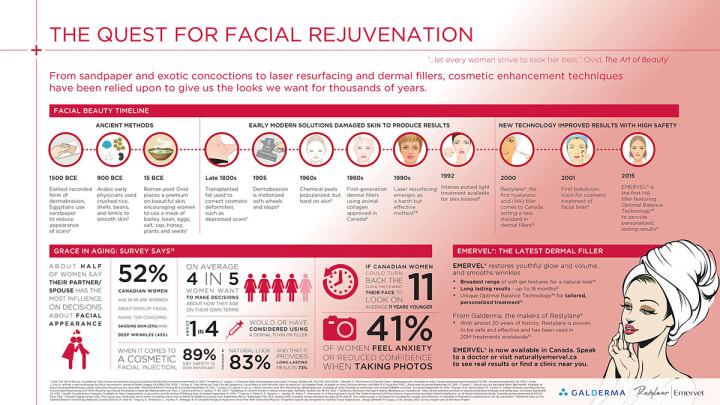How Does Weight Impact Skin?
How does weight impact skin? A little extra weight for women can help reduce wrinkles and signs of aging in your 40s.

When it comes to keeping your youthful looks as you get older, nature doesn't play fair. Over 40, it's said, a woman must choose between her face and her body: The thinner you are, the faster your face will appear to age. But do you really have to sacrifice your body image to save your face? Hardly. Just compare super thin Uma Thurman to curvy JLo and you can see the possible high benefit/low cost to your looks of carrying a little extra—if you do it right. You don't want to compromise your health strictly for a more youthful face, either. The solution to both dilemmas lies in how you manage adding some pounds to your body.
"A heavy person will always appear younger than someone who is thinner," says Richard Fleming, M.D., a plastic surgeon in Beverly Hills. "It's not that carrying more weight actually slows facial aging." Not only does extra fat plump out wrinkles, it may mask other age-related changes, such as loss of bone mass in the jaw and cheek. Changes start showing in the early forties, when most men and women begin to notice what surgeons refer to as skin redundancy, the unsightly folds and jowls that can add years to your looks. The skin itself may not be noticeably wrinkled yet, but even a satin-smooth complexion droops under the surface.

Image via GALDERMA
Weakened Muscle
Skin redundancy is due to the breakdown of various tissues of the face, says Sam T. Hamra, M.D., a Dallas-based plastic surgeon: "First, everybody gets some muscle atrophy, and when muscles shrink, the skin over them sags." Second, weakened muscle tone causes some of the fat on the cheekbone to slide down, deepening the "smile line" between the nose and lips. (The more fat in the face to begin with, the less noticeable this change.) Third, bone loss and the breakdown of supportive collagen reduce the underlying frame of the face, and by now skin is too lax to shrink to fit. Since collagen breakdown is accelerated by sun damage, former tan fans will show these changes earlier.
Super-lean women wrinkle more noticeably and sag sooner because they have so little fat in their faces that every little breakdown is magnified on the skin's surface. Even surgery doesn't always help in these cases because there's so little fat to work with, explains Hamra. Women who undergo liposuction in their youth to remove extra fat in their cheeks will regret it by the time they hit middle age, for the same reasons. Worst off are women who abruptly lose large amounts of weight in their late thirties and beyond—they look older than if they had never lost the weight because the extra skin will just hang. Frequent fluctuations in weight throughout life also cause skin to lose its snap, accelerating the development of jowls and folds.
There's no question that gaining weight as you get older can ease signs of facial aging, and it doesn't have to be a big enough gain to do in a youthful-looking body either; a relatively small gain can plump up a drawn face. The trickier issue is the impact weight gain may have on your health and longevity. One controversial theory holds that putting on some pounds may not be detrimental to your health, and may, up to a point, improve it. Notes Reubin Andres, M.D., clinical director of the Gerontology Research Center of the National Institute on Aging (NIA), "The best weight for overall survival increases with age." That runs smack up against the theory of calorie restriction, which holds that a lifetime of underfeeding and low weight may stretch the human life span. "Calorie deprivation is not well understood," says Andres, "but the findings so far are based on underfeeding obese lab rats, not normal rats in their natural environment, so the model may not be applicable to humans."
Sleep well while keeping your face looking young and wrinkle free, with the latest products from Juverest.
Benefit of Adding Fat
In fact, longitudinal studies in humans at NIA don't square with what's been found in rats. "There is a broad range of weight that is healthy," says Andres. What's risky are extremes—being very overweight or too lean and carrying fat around the waist or above, where it hikes the risk of heart disease.
Not all experts buy Andres’s conclusions. "There is no known benefit of adding fat to someone who is already healthy," says Edward Mascioli , M.D., assistant professor of nutrition at Harvard Medical School . "For instance, the Nurses Health Study has shown that if women gain just 15 pounds over their ideal healthy weight, the risk of diabetes rises significantly." Mascioli blames theories that weight gain may be safe on flawed conclusions based on faulty data.
So how do you know if it is safe for you to gain? Start with the formula Mascioli uses for determining healthy weights. Women should allow 109 pounds for the first five feet of height, then four pounds per inch thereafter. Men can allow 116 pounds for the first five feet of height, then four pounds per inch thereafter. "This is the midpoint of a range," says Mascioli. "Your weight could fall about 10 percent on either side and still be healthy." In other words, a healthy woman who is five foot six could weigh 133-give or take about 13 pounds, depending on her frame. If you see some leeway to put on a few pounds, consult a physician who knows your dietary habits and life-style.
If you and your doctor determine that it would be safe, the next consideration is to gain in as healthy a manner as possible. You can't "direct" weight to go only where you want it—your face. In general, added pounds will zero in on areas where you already have fat—for most women, hips and thighs. "Plus, the older you get, the less well your body 'packages' fat," explains Hamra, resulting in loose thighs and flabby upper arms. But you can affect its underpinnings. Maintaining good overall muscle tone may at least minimize age-related changes in your face, as well as the rest of your body. The best choice here is strength training. Done regularly (say, three times a week, under a trainer's guidance at first), it can help firm flabby areas if you do gain weight. Concentrate on the zones where you tend to get fat first.
Similarly, tailor your weight-gaining plan to weak spots in your diet, suggests Mindy Hermann, R.D., a registered dietitian in Mount Kisco, New York. "If you're very thin, you're probably not getting enough fat or whole grains anyway," says Hermann. Her ideal approach: Use the minimum recommendations of the new pyramid plan from the USDA as a baseline diet, and inch up your intake from there if you still need to gain. The plan calls for a minimum of 475 calories a day from fat; two servings of dairy products; two 2-oz. servings of meat, poultry or fish; three servings of vegetables; two of fruit; six servings of breads, cereals and pastas. The plan totals about 1,600 calories, with less than 30 percent from fat. For many, though, weight gain may just happen naturally, since metabolism slows with age, resulting in an extra pound a year in your thirties if food intake remains the same. The biggest improvement in appearance will occur in women who were lean to begin with—and if you can live with bigger hips, they can live with you.
About the Creator
Mackenzie Lu
Namaste. Active yogi and life enthusiast. It has become her mission to spread the benefits of having the mind, body, and soul in tune with one another.
Enjoyed the story? Support the Creator.
Subscribe for free to receive all their stories in your feed. You could also pledge your support or give them a one-off tip, letting them know you appreciate their work.






Comments
There are no comments for this story
Be the first to respond and start the conversation.